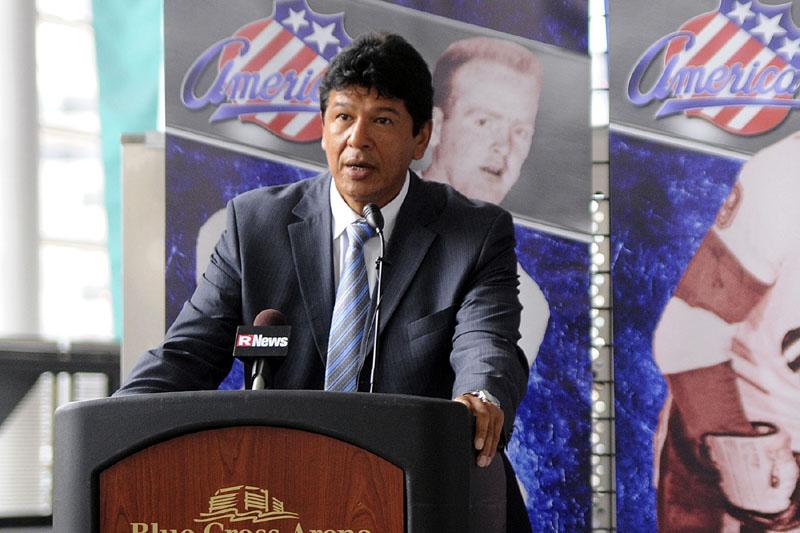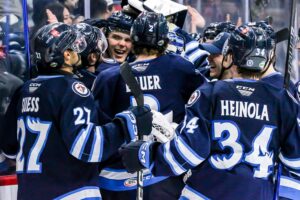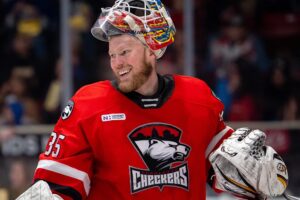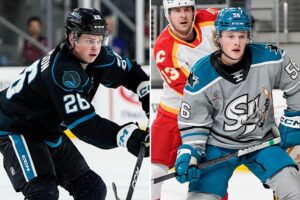by Warren Kosel || AHL On The Beat Archive
When Ted Nolan was last a part of the Rochester Americans organization, he had one goal in mind: to win a championship. As fate would have it, 25 years later Nolan has returned to the very team he captained during the 1984-85 season, and although his role may be different, his objective from a quarter of a century ago remains unchanged.
“Twenty-five years ago, if someone told me I’d be back here in Rochester, I most likely would have not believed them,” said Nolan, who was appointed the Amerks’ vice president of hockey operations over the summer prior to the start of Rochester’s 54th season in the American Hockey League. “Today I’m filled with great pride and honor to be working for the first First Nation-owned professional hockey organization. I’m looking forward to the challenges of helping put Rochester back on top. Working for one of the most storied franchises in the American Hockey League is an honor.”
But the 51-year-old Nolan is back, and his return to Rochester was fueled by a combination of the experience he gained being a part of the organization back during his playing days and his desire, along with the ownership group, to win. But more importantly, Nolan sees it as an opportunity to come back to where it all started for him.
“There have been a lot of things that have changed since I’ve been back here, but I feel you really can’t appreciate where you’re going in life until you really appreciate where you have been,” said Nolan. “Rochester played a tremendous role in jumpstarting my career and I would not be where I am today if it wasn’t for this team and this city.”
Since his days in the Flower City, Nolan has enjoyed success as a player, coach and humanitarian. His resume includes four seasons as a head coach in the National Hockey League, the 1996-97 Jack Adams Award as NHL Coach of the Year, a Calder Cup championship, a Memorial Cup title and numerous honors for his philanthropic efforts.
“Ted Nolan has been an inspiration for First Nations/Native American youth for many years,” said Amerks owner and CEO Curt Styres. “His drive and determination to be a professional hockey player and play in the NHL was realized through plenty of hard work and not just natural ability.”
“We are excited to have Ted Nolan join the Amerks and head up our hockey operations,” said team president Lewis Staats. “Ted is a proven winner at everything he has been involved in, both on and off the ice, and we are confident that his leadership and management skills will be an asset to our entire organization.”
This season, Nolan is working hand-in-hand with former Adirondack Red Wings teammate and current Amerks director of player personnel Jody Gage. He oversees all aspects of hockey, from corresponding with the parent Florida Panthers to restoring pride in the franchise to selling Amerk hockey.
The dynamic duo began the process of rebuilding the Amerks as an elite status (once again), as evidenced by the offseason signings of free-agent forwards Graham Mink, Jeff Taffe, Jamie Johnson, Mike York and future Amerk Hall-of-Famer Chris Taylor. On the blue line Rochester added Clay Wilson, among the AHL’s top offensive defenseman.
Before the reunion of Nolan and Gage on the business side of the sport, the two spent five seasons (1979-84) as teammates, and roommates while on the road, with the Adirondack Red Wings in the AHL. After Nolan was released by Detroit following the 1983-84 season, he signed a one-year deal with the Amerks and finished his only season in Rochester sixth on the team in points (62) and third in penalty minutes (152). He ended his playing career in 1985-86 as he split time with the AHL Baltimore Skipjacks and the NHL’s Pittsburgh Penguins.
But before his tenure in Rochester (as a player) was over, Nolan sat down with then-GM George Bergantz and told him that he had a teammate back in Adirondack looking for a team for next season. That teammate was none other than Jody Gage. Gage, like Nolan, would be given his dismissal from Detroit and opted to sign with the Amerks, where in 11 seasons, he became the franchise’s all-time leader in games played (653), goals (351), assists (377) and points (728). It was Nolan who convinced Gage to come to Rochester and it was Nolan who helped create “Mr. Amerk.”
 |
| • Albany spark plug making his case |
| • From one captain to another |
| • Sauer continuing a family tradition |
| • AHL ON THE BEAT ARCHIVE |
“Toward the end of my season here in Rochester (1984-85), I sat down with Bergantz and I said, ‘This guy is for real. He’s got what it takes and he’s got a great hockey mind. And it just so happens that he’s looking for a place to play next season.’ Jody has revolutionized hockey in this town and had made Rochester his home.”
But the main reason Nolan was brought in by the Amerks’ management team was to help restore the pride and winning tradition of what was once the Rochester Americans. Nolan’s main focus is not only to win, but to entertain and re-establish the community pride surrounding the team.
“Being competitive and winning is always the top priority,” said Nolan. “It was the same for me 25 years ago when I was a player here and it’s the same now. This team is one of the most storied franchises in the AHL and we need to embrace that by putting a quality, aggressive team on the ice.”
“I believe in miracles and I believe this team can once again be a playoff-caliber team and championship contenders,” added Nolan. “We obviously want the Cup, but in order to do that, we need to reinvent the interest of the Amerks in our fans and the community. We need to reach out to the fans and make them feel appreciated, because it’s simple. No fans, no us.”
Nolan was born on the Garden River First Nation just outside Sault Ste. Marie, Ont., and played for the Soo Greyhounds of the Ontario Hockey League. The left winger was selected by the Detroit Red Wings in the fifth round (78th overall) in the 1978 NHL Amateur Draft. His pro career spanned eight seasons, most of them in the American Hockey League (1978-85). He played in 374 AHL games with teams in Adirondack, Rochester and Baltimore. During that time, Nolan also appeared in 78 NHL games between the Detroit Red Wings and Pittsburgh Penguins.
Nolan was a member of Adirondack’s Calder Cup championship team in 1980-81 and appeared in 299 games with the Red Wings from 1979-84.
After his retirement, Nolan returned to Sault Ste. Marie as an assistant coach and then was head coach from 1988 until 1994, leading the Greyhounds to three consecutive Memorial Cup tournament berths and winning the championship in 1993.
Nolan was promoted to the NHL following the 1993-94 season, taking an assistant job with the Hartford Whalers. The next season, he accepted the position of head coach of the NHL’s Buffalo Sabres, where he had his best success. In his second season in Buffalo (1995-96), he led the team to the Northeast Division title and a berth in the conference finals. After helping the Sabres to a 19-point improvement in the standings and the team’s first division title in 16 years, he was rewarded by being named the NHL Coach of the Year.
He returned to competitive coaching after an eight-year absence as the head coach and director of hockey operations for the Moncton Wildcats of the Quebec Major Junior Hockey League. In 2005-06, he led Moncton to its first-ever QMJHL title and a trip to the Memorial Cup, where they finished second. For his efforts, he was named the QMJHL All-Star head coach and the league’s General Manager of the Year.
He returned to the professional ranks in 2006 with the New York Islanders and led the team to the Stanley Cup Playoffs. In a March 2008 Sports Illustrated player survey, he was rated second to only Detroit’s Mike Babcock as the coach players would most like to play for. In two seasons on Long Island he guided the Islanders to a record of 73-68-0 to improve his lifetime record to 147-140-40 as an NHL head coach.
Now that he’s back in Rochester, the very place where it all started for him, Nolan knows what it takes to bring the Amerks back to the top – organizational unity.
“I’ve always said, ‘If you want to go somewhere slow, go on your own, but if you want to go somewhere fast, then go together.’ Everyone affiliated with the Rochester Americans organization; our players, our fans and our community. If we come together, we will bring this team back to greatness just like it once was.”






































